View As Webpage | View Archives | Email a Friend
| |
| |
 |
 |
| |
 |
|
@{mv_date_MMM d, yyyy}@ |
|
| |
 A group of Crimean businesspeople have planned to start growing oyster spat near Sevastopol, under a technology recently developed by the Russian Academy of Science. The new technology was recently rolled out by the Kovalevsky’s Institute of Biology of the Southern Seas. Currently, around 15 million oysters are consumed in Russia per year, and a growing number of them come from local farms. However, the entire spat supplies are coming from abroad, primarily the EU.
» Read more
A group of Crimean businesspeople have planned to start growing oyster spat near Sevastopol, under a technology recently developed by the Russian Academy of Science. The new technology was recently rolled out by the Kovalevsky’s Institute of Biology of the Southern Seas. Currently, around 15 million oysters are consumed in Russia per year, and a growing number of them come from local farms. However, the entire spat supplies are coming from abroad, primarily the EU.
» Read more
For aquaculture producers, feed is commonly the largest single expense, typically representing more than two-thirds of total production costs. Looking to find innovative ways to improve feed conversion efficiency, Vietnam-based barramundi producers Australis Aquaculture partnered with Xelect in 2018, and have been running an advanced genetics-backed breeding program. The two companies have now announced there's a high correlation between fasting tolerance and conversion efficiency, which suggests significant gains.
» Read more
Aquaculture Courses and the University of St Andrews in Scotland are currently offering 15 fully funded CSC scholarships to obtain an M.Sc. in sustainable aquaculture, with the pre-application window open from Feb. 15 to Apr. 5, 2022. The full CSC scholarships, which cover all tuition fees for the two-year distance learning masters in sustainable aquaculture are open to students living in certain Commonwealth countries.
» Read more
|
| |
|
| |
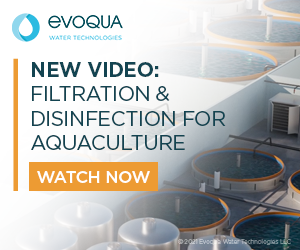
From RAS to transporting fish in well-boats, highly controlled water conditions are critical for long-term, productive growth. Discover how Evoqua’s range UV, Ozone, and Filtration system technologies can be applied across the aquaculture industry to achieve optimal water conditions, while ensuring sustainable operations for fish health and improving your yields and quality. Weather you’re looking to maximize the efficiency of your RAS system or improve the hygiene of your Evoqua’s leading solutions help boost the performance of the aquaculture industry.
» watch video |
| |
|
| |
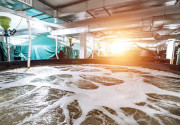 An eventful year is upon us, with new opportunities to learn and expand our knowledge, right at our door. The hatchery industry in particular is looking to incorporate new technologies and systems into every day operations in order to achieve greater sustainability, efficiency, and fish health and welfare, than ever before.
» Read more
An eventful year is upon us, with new opportunities to learn and expand our knowledge, right at our door. The hatchery industry in particular is looking to incorporate new technologies and systems into every day operations in order to achieve greater sustainability, efficiency, and fish health and welfare, than ever before.
» Read more |
| |
|
| |

Our changing climate and growing population challenge the world’s food supply, especially in aquaculture, which is more prone to problems associated with climatic variability. Innovative scientists are turning to advanced genomic tools to enhance the production efficiency, sustainability, product quality and profitability of aquaculture. They’re partnering with LGC, Biosearch Technologies to help optimise their workflows for maximum genetic gain using a modern agrigenomic approach.
» Learn more |
| |
|
| |
Nofima researchers and partners have announced the development of a promising method to sterilise salmon, which they’ve been working on for several years and further, can document that sterile salmon are just as healthy as fertile salmon. There’s been a demand for sterile farmed salmon, as this can limit the impact of escaped farmed salmon in rivers; additionally, sterile salmon production will contribute to improved meat quality, less disease, and lower mortality.
» Read more
|
|
More than one per cent of the catfish fillets from each harvest is rejected by processing plants due to diffuse red discolouration in the fillet. Per 2019 data, the estimated annual loss was US$683,000 for catfish processors. In the study by Shay S. Keretz et al., “Effects of Aeromonas sobria on physiology and fillet quality of market-sized channel catfish,” fillets from channel catfish inoculated with bacteria A. sobria demonstrated redness values similar to that of the catfish fillets rejected by processors.
» Read more
» Read more
| | |
|
| |
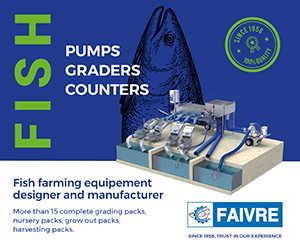
|
| |
|
| |
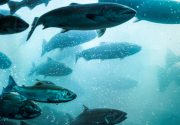 Managing water quality and preventing disease from affecting your yields is a complicated process that can involve many different technologies and solutions. To help companies protect against waterborne infection and disease, Evoqua recently hosted a webinar dedicated to understanding and improving water quality in land-based hatcheries. In addition to sharing some expertise, Evoqua has compiled detailed answers to our eight most frequently asked questions when it comes to solutions the company can provide for the aquaculture industry.
» Read more
Managing water quality and preventing disease from affecting your yields is a complicated process that can involve many different technologies and solutions. To help companies protect against waterborne infection and disease, Evoqua recently hosted a webinar dedicated to understanding and improving water quality in land-based hatcheries. In addition to sharing some expertise, Evoqua has compiled detailed answers to our eight most frequently asked questions when it comes to solutions the company can provide for the aquaculture industry.
» Read more |
| |
|
| |
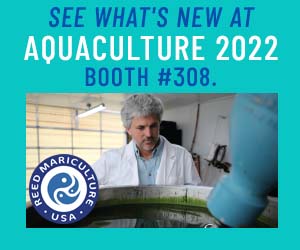
Mar. 30-31, 2022
Hilton Head Island, South Carolina, USA
» Read more
|
| |
| |
&cm1=1)
|









